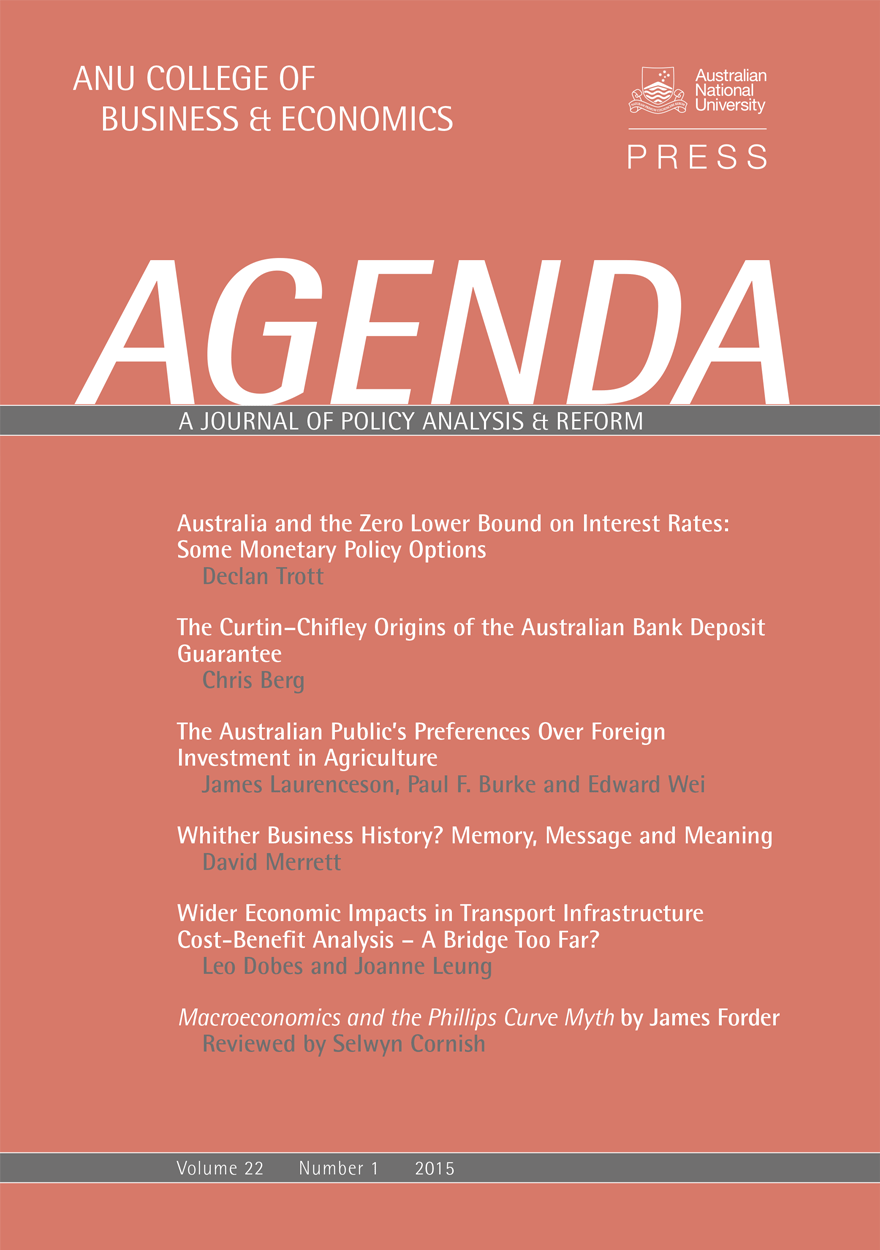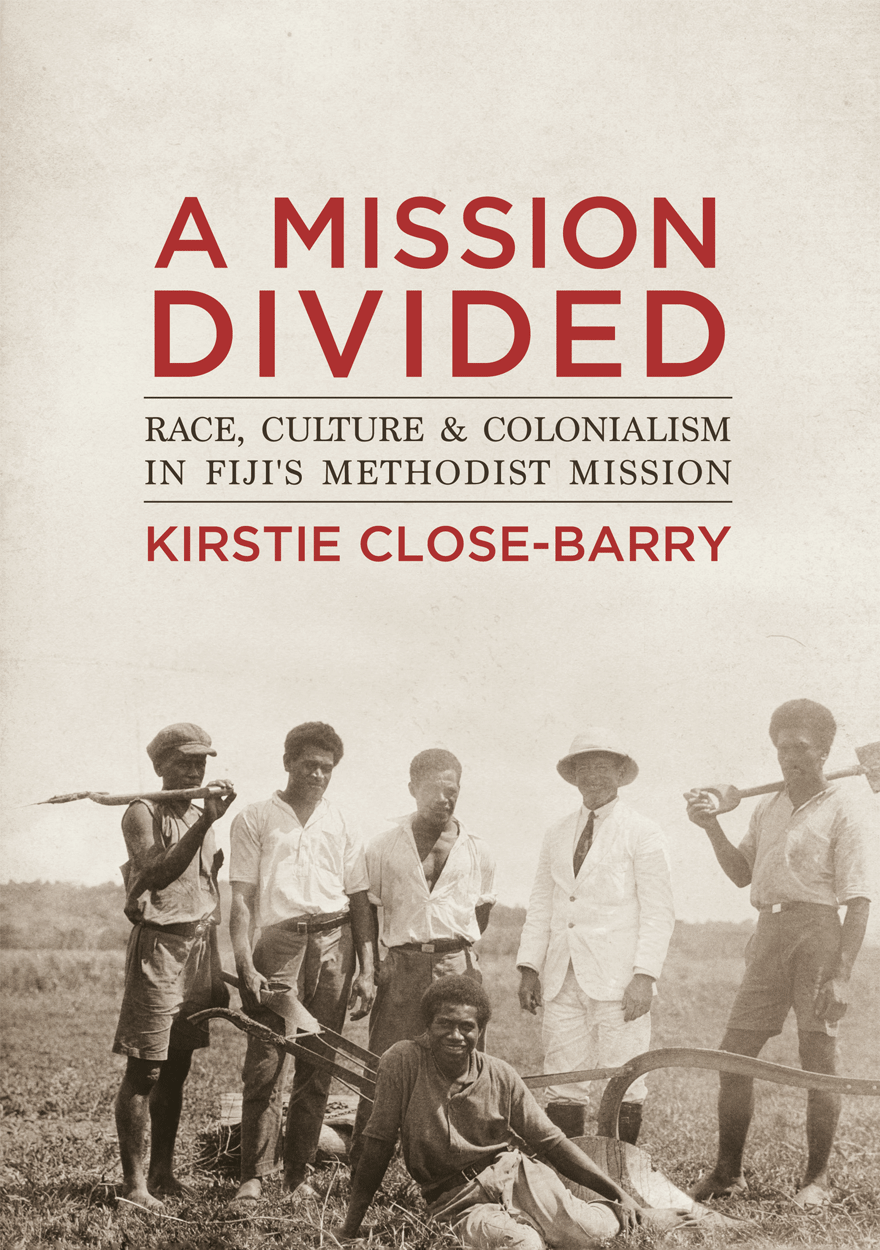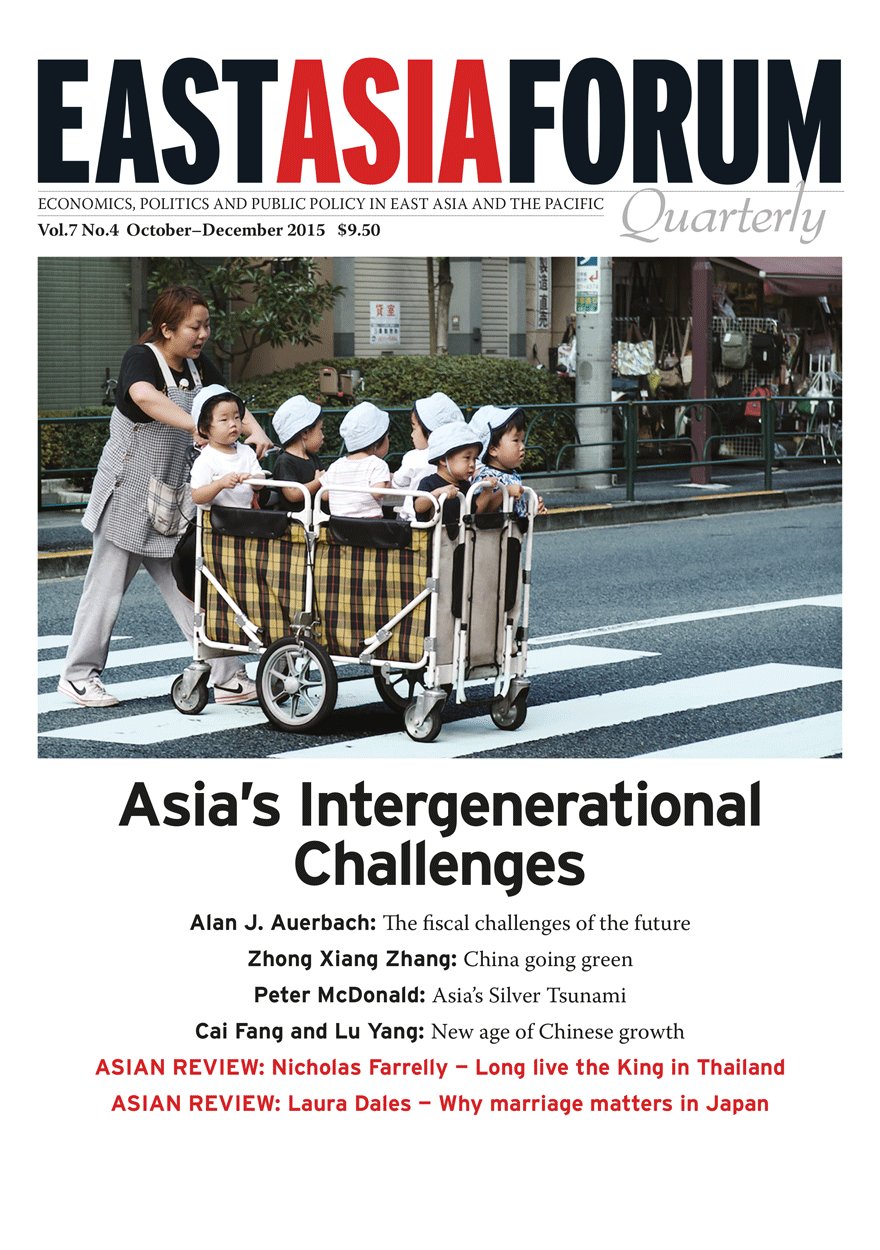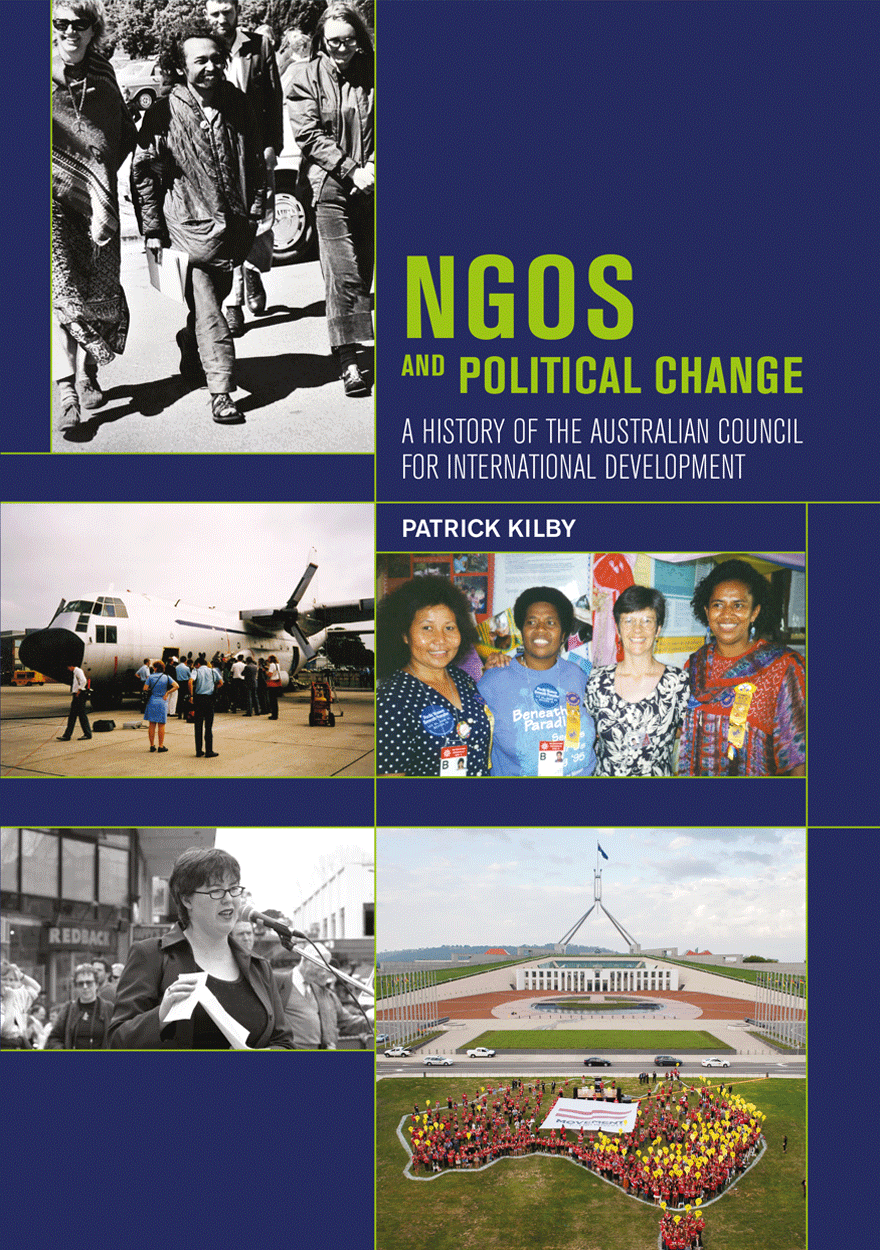Search titles
Displaying results 131 to 140 of 358.

Agenda - A Journal of Policy Analysis and Reform: Volume 22, Number 1, 2015 »
Edited by: William Coleman
Publication date: December 2015
Agenda is a refereed, ECONLIT-indexed and RePEc-listed journal of the College of Business and Economics, The Australian National University. Launched in 1994, Agenda provides a forum for debate on public policy, mainly (but not exclusively) in Australia and New Zealand. It deals largely with economic issues but gives space to social and legal policy and also to the moral and philosophical foundations and implications of policy.
Subscribe to the Agenda Alerting service if you wish to be advised on forthcoming or new issues.
Download for free
Not available for purchase

A Mission Divided »
Race, Culture and Colonialism in Fiji’s Methodist Mission
Authored by: Dr Kirstie Close-Barry
Publication date: December 2015
This book provides insight into the long process of decolonisation within the Methodist Overseas Missions of Australasia, a colonial institution that operated in the British colony of Fiji. The mission was a site of work for Europeans, Fijians and Indo-Fijians, but each community operated separately, as the mission was divided along ethnic lines in 1901. This book outlines the colonial concepts of race and culture, as well as antagonism over land and labour, that were used to justify this separation. Recounting the stories told by the mission’s leadership, including missionaries and ministers, to its grassroots membership, this book draws on archival and ethnographic research to reveal the emergence of ethno-nationalisms in Fiji, the legacies of which are still being managed in the post-colonial state today.
Analysing in part the story of her own ancestors, Kirstie Barry develops a fascinating account of the relationship between Christian proselytization and Pacific nationalism, showing how missionaries reinforced racial divisions between Fijian and Indo-Fijian even as they deplored them. Negotiating the intersections between evangelisation, anthropology and colonial governance, this is a book with resonance well beyond its Fijian setting.
– Professor Alan Lester, University of Sussex
This thoroughly researched and finely crafted book unwraps and finely illustrates the interwoven layers of evolving complexity in different interpretations of ideals and debates on race, culture, colonialism and independence that informed the way the Methodist Mission was run in Fiji. It describes the human personalities and practicalities, interconnected at local, regional and global levels, which influenced the shaping of the Mission and the independent Methodist Church in Fiji. It documents the influence of evolving anthropological theories and ecumenical theological understandings of culture on mission practice. The book’s rich sources enhance our understanding of the complex history of ethnic relations in Fiji, helping to explain why ethnic divisive thinking remains a challenge.
– Jacqueline Ryle, University of the South Pacific
A beautifully researched study of the transnational impact of South Asian bodies on nationalisms and church devolution in Fiji, and an important resource for empire studies as a whole.’
– Professor Jane Samson, University of Alberta, Canada

Through a Glass Darkly »
The Social Sciences Look at the Neoliberal University
Edited by: Margaret Thornton
Publication date: November 2015
This collection of essays arose from a workshop held in Canberra in 2013 under the auspices of the Academy of Social Sciences in Australia to consider the impact of the encroachment of the market on public universities. While the UK tripled fees in 2013 and determined that the teaching of the social sciences and the humanities would no longer be publicly funded, it was feared that Australia would go further and deregulate fees altogether.
In the best tradition of the social sciences, the contributors have assumed the role of critic and conscience of society to present penetrating analyses of the ramifications of the corporatisation of the university as neoliberalism continues to occupy the ascendant position in the political firmament. The dramatis personae in these analyses are students, academics, managers and political mandarins with the gendered character of corporatisation an important sub-theme.

East Asia Forum Quarterly: Volume 7, Number 4, 2015 »
Publication date: November 2015
East Asia Forum Quarterly grew out of East Asia Forum (EAF) online, which has developed a reputation for providing a platform for the best in Asian analysis, research and policy comment on the Asia Pacific region in world affairs. EAFQ aims to provide a further window onto research in the leading research institutes in Asia and to provide expert comment on current developments within the region. The East Asia Forum Quarterly, like East Asia Forum online, is an initiative of the East Asia Forum (EAF) and its host organisation, the East Asian Bureau of Economic Research (EABER) in the Crawford School of Economics and Government in the College of Asia & the Pacific at The Australian National University.
Download for free
Not available for purchase

Managing Under Austerity, Delivering Under Pressure »
Performance and Productivity in Public Service
Edited by: John Wanna, Hsu-Ann Lee, Sophie Yates
Publication date: October 2015
Contemporary public managers find themselves under pressure on many fronts. Coming off a sustained period of growth in their funding and some complacency about their performance, they now face an environment of ferocious competitiveness abroad and austerity at home. Public managers across Australia and New Zealand are finding themselves wrestling with expenditure reduction, a smaller public sector overall, sustained demands for productivity improvement, and the imperative to think differently about the optimal distribution of responsibilities between states, markets and citizens.
Given ever-shrinking resources, in terms of staffing, budgets and time, how can public managers and public services become more productive, more outcome-driven and more agile? How can we achieve better alignment between ever-growing citizen expectations and the realities of constrained service provision? What can we learn from the best combination of innovation and austerity already being delivered in other countries and sectors, including harnessing the grounded wisdom of frontline service delivery practitioners?
This book focuses on practical ways public managers at home and abroad are dealing with these shared dilemmas. It brings together renowned scholars in the fields of public sector productivity, performance management, ‘frugal innovation’ and budget stringency, with leading international and Australasian practitioners sharing their successes and challenges.

A New Era? »
Timor-Leste after the UN
Edited by: Sue Ingram, Lia Kent, Andrew McWilliam
Publication date: September 2015
Timor-Leste has made impressive progress since its historic achievement of independence in 2002. From the instability that blighted its early years, the fledgling democratic country has achieved strong economic growth and a gradual reinstatement of essential social services. A decade on in 2012, Presidential and Parliamentary elections produced smooth political transitions and the extended UN peacekeeping presence in the country came to an end. But significant challenges remain. This book, a product of the inaugural Timor-Leste Update held at The Australian National University in 2013 to mark the end of Timor-Leste’s first decade as a new nation, brings together a vibrant collection of papers from leading and emerging scholars and policy analysts.
Collectively, the chapters provide a set of critical reflections on recent political, economic and social developments in Timor-Leste. The volume also looks to the future, highlighting a range of transitions, prospects and undoubted challenges facing the nation over the next 5–10 years. Key themes that inform the collection include nation-building in the shadow of history, trends in economic development, stability and social cohesion, and citizenship, democracy and social inclusion. The book is an indispensable guide to contemporary Timor-Leste.

A Dissident Liberal »
The Political Writings of Peter Baume
Edited by: John Wanna, Marija Taflaga
Authored by: Peter Baume
Publication date: September 2015
In the ‘broad church’ of the Australian Liberal Party, rarely has there been a maverick so unrelenting in his commitment to personal principles as Senator Peter Baume. Over a parliamentary career spanning 17 years, three ministerial portfolios and five party leaders, Baume was increasingly pitted against his own party room.
In A Dissident Liberal: The Political Writings of Peter Baume, we learn of personal threats, crises, constitutional confrontation and the tension between conservatism and classical liberalism—and between ideology and toeing the party line. This collection of personal observations, speeches and commentaries on contentious policy issues presents a valuable resource for students of Australian political history.

NGOs and Political Change »
A History of the Australian Council for International Development
Authored by: Patrick Kilby
Publication date: August 2015
The Australian Council for International Development is the peak body of Australian international development NGOs. This book explores ACFID’s history since its founding in 1965, drawing on current and contemporary literature as well as extensive archival material. The trends and challenges in international development are seen through the lens of an NGO peak body: from the heady optimism of the first Development Decade of the 1960s, through the growth in government support of NGOs in the 1980s, to the challenges of the 2010s. The major themes of ACFID are presented: human rights; gender justice; humanitarianism; NGO codes of conduct; and influencing government policy both broadly and as it relates to NGOs. Each of these themes is placed in a global context and in relation to what other NGO networks are doing internationally.

Change! »
Combining Analytic Approaches with Street Wisdom
Edited by: Gabriele Bammer
Publication date: July 2015
Change happens all the time, so why is driving particular change generally so hard? Why are the outcomes often unpredictable? Are some types of change easier to achieve than others? Are some techniques for achieving change more effective than others? How can change that is already in train be stopped or deflected?
Knowledge about change is fragmented and there is nowhere in the academic or practice worlds that provides comprehensive answers to these and other questions. Every discipline and practice area has only a partial view and there is not even a map of those different perspectives. The purpose of this book is to begin the task of developing a comprehensive approach to change by gathering a variety of viewpoints from the academic and practice worlds.

The Seven Dwarfs and the Age of the Mandarins »
Australian Government Administration in the Post-War Reconstruction Era
Edited by: Samuel Furphy
Publication date: July 2015
In the history and folklore of Australia’s Commonwealth Public Service, the idea of the ‘Seven Dwarfs’ has been remarkably persistent. Originally a witty epithet applied to a powerful group of senior public servants, the term has come to represent the professionalisation of Australian government administration during the Second World War and post-war reconstruction era, and into the following two decades of expansion. This was a period when, for the first time, talented university graduates entered the public service, rose to senior levels, and exerted great influence over the affairs of the Commonwealth. With the secure tenure of being permanent heads of departments, they defined the age of the public service mandarin.
This book explores the lives and influence of the Seven Dwarfs and their colleagues, bringing together the leading researchers on post-war Australian administration. Featuring four thematic chapters and ten biographical portraits, it offers a fascinating insight into the workings of the Commonwealth Public Service during a critical period in its history.



